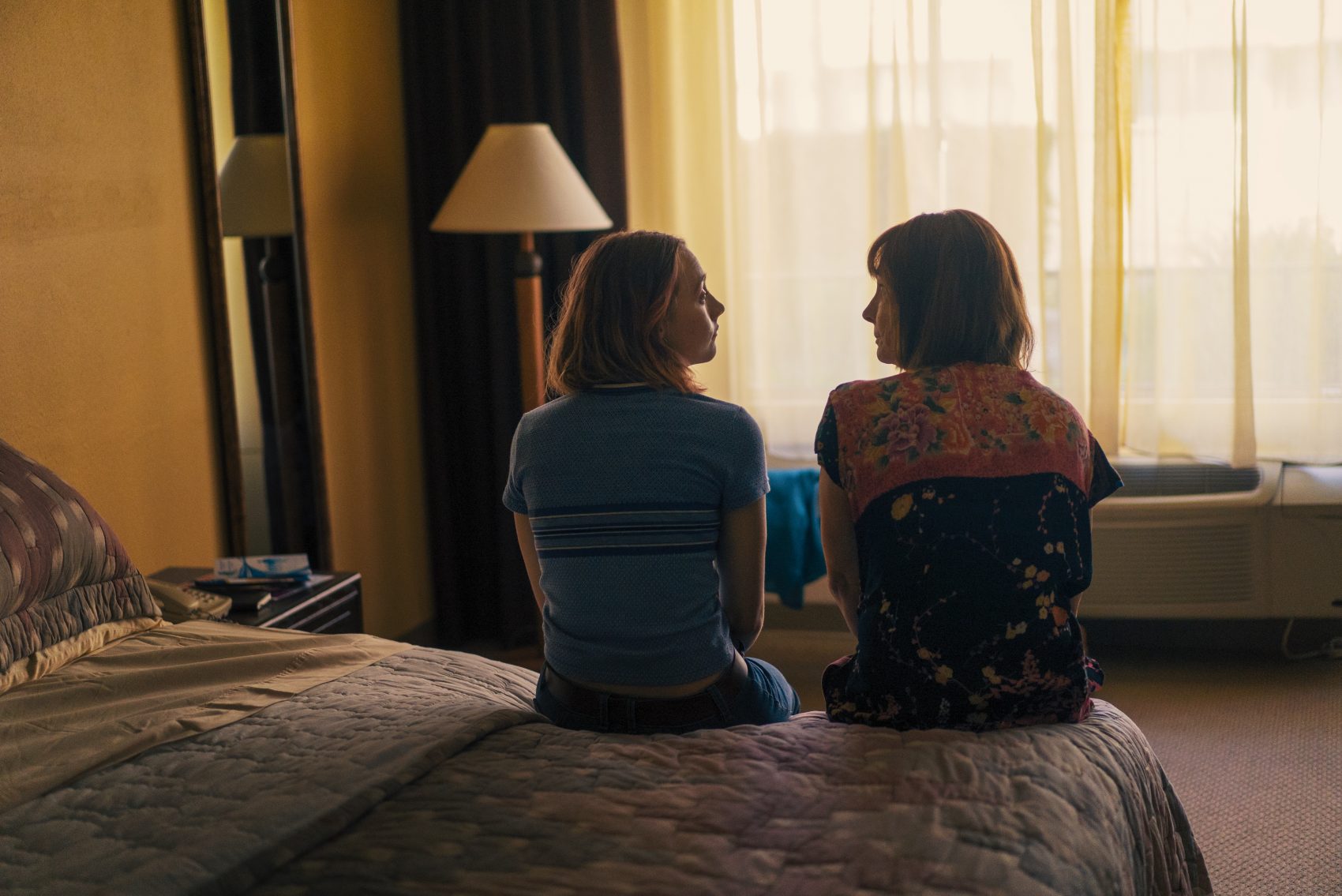
Lady Bird follows Christine “Lady Bird” McPherson (Saoirse Ronan) in early 2000s Sacramento as she prepares for college amidst her senior year of high school and journey to self-discovery as a teenager transitioning to young adulthood. Through an angsty relationship with her mother Marion (Laurie Metcalf) and typical teen friendship with her bestie Julie (Beanie Feldstein), Lady Bird tries to balance who and where she wants to be with who and what she is.
Lady Bird is a satisfying coming of age tale that not only examines the basic transition from the last year of our childhood to proverbial young adulthood, but puts this transition into a socioeconomic context by examining the effect that belonging lower-middle/upper-lower class family has on this period of one’s life. Lady Bird’s struggles to fit in are not just the typical struggles of a young person that wants to be part of the crowd and recoils at the thought of standing out, she wishes to have a slice of a more idyllic life, one that includes greater economic standing and opportunity. This is especially impactful for Lady Bird as she aspires to move away to the East Coast for her undergraduate studies but the ability of her parents to pay for such a move seems bleak and unlikely.
It puts an interesting twist on a coming of age movie trope (and ordinary teenage experience most of us have gone through); the moment Lady Bird drifts away from Julie in favor of a cool, new friend Jenna (Odeya Rush). It’s not just Lady Bird trying to fit in with the cool kids, it’s her trying desperately to achieve some sort of close proximity to a level of wealth which would ostensibly solve all of her problems. It’s a unique, very timely thread to include within a coming of age film considering the economic times in which we currently live.
Another way that I found Lady Bird to have separated itself from the usual teenage coming of age tale was its examination of the relationship between mothers and daughters. Lady Bird and Marion have an extremely contentious relationship, that result in constant bickering, a couple of huge fights, and even a bout of silent treatment from mother to child. Despite this, in the end we see that even though both can be stubborn to a fault in their dealings with one another, the love that they share as mother and daughter will also be there no matter what. When Lady Bird finally leaves the nest, Marion is heartbroken that her daughter is gone, even after trying to put up a steely front. And when away from home for the first time, after having experienced a rough night, Lady Bird calls her mother for solace, and to convey her appreciation for all that she’s done.
Admittedly, although I found it interesting watch unfold onscreen, because I am not a woman, I can’t shake the sense that this aspect of the film did not resonate me as strongly as it should have. After watching, and digesting the movie after my viewing, it really feels as if the inclusion of this aspect of the film by director Greta Gerwig is meant to be uniquely impactful for women viewers and something that emotionally resonates on a greater level for those that have experienced this specific parent-child dynamic. Even though consideration of outside opinions is something we avoid on this website, I can’t help but worry that my lower ranking of this film is largely attributable to this issue and I hope that my gender-based blind spot is too problematic; and if it is, that my explanation of it here helps to guide your interpretation of my review and what you should expect upon your own viewing.
Lady Bird is an extremely well acted and directed film. Irish raised Saoirse Ronan is entirely convincing as a teenage American girl and continues her ascent as a young actress of note in Hollywood. She’s able to convey the blurred line between self-assuredness/independence and confusion and uncertainty that is the development of young adulthood. Lady Bird is also notable for the return to the zeitgeist for Laurie Metcalf. She shines as a mother whose love and desire for the best for her child can at times drift away too much into over-protectiveness and harshness. In her many viewers, particularly women, will see either their own mother or themselves. The film is also beyond an impressive debut for Gerwig as a writer/director. She managed to take a genre that can easily delve into the cliche or the repetitive and added enough unique and new things to make her film stand on its own.
Lady Bird is a quality coming of age that follows some familiar beats of the genre but adds a strong enough topical theme and unique vantage point to allow it to avoid becoming just another teenage story. Saoirse Ronan and Laurie Metcalf are called to do a lot of heavy lifting in the film and pull it effortlessly. The supporting cast also shines and helps the story and the film remain interesting engaging. Lady Bird is a worthwhile watch and will hold a special place for mothers and daughters in particular.
Image: A24

